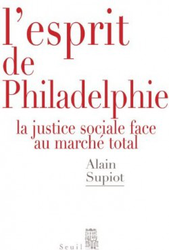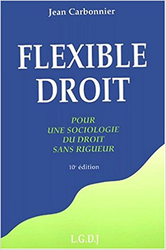
Updated: Sept. 8, 2018 (Initial publication: April 30, 2018)
Publications

► This working document was intended to serve as a support for a conference pronounced in French in the conference Droit et Ethique ( Law & Ethics) of May 31, 2018 in a symposium organized by the Court of Cassation and the Association Française de Philosophie du Droit. French Association of Philosophy of Law on the general theme Law & Ethics.
See a general presentation of this conference.
Rather, it has served as a support for the article to be published in the Archives de Philosophie du Droit (APD). This article is written in French.
► Summary: It is through the Law that the human being has acquired a unity in the West (I). What religion could have done, the Law also did by posing on each human being the indetachable notion of him of "person" (I.A). But this is what is challenged today, not the personality and the power that the human being has to express his freedom but the unity that implies in the disposition that we have of ourselves in repelling the desire that others have always had to dispose of us. Current law tends to "pulverize" human beings into data and transform into neutral legal services what was considered before as the devouring of others. The legal concept of "consent", ceasing to be proof of a free will but becoming an autonomous concept, would suffice (I.B.).
To prevent the reigning of the "law of desires", which merely reflects the adjustment of forces, we must demand here and now the ethical sovereignty of Law, because Law can not be just just be just the interests adjustment (II). We can form this request if we do not want to live in an a-moral universe (II.A), if we see that the unity of the person is the legal invention that protects the weak human being (II.B.). If we admit this imperative, then we must finally ask who in the legal system will express and impose it, especially the legislator or the judge, because we seem to have lost the ability to recall this principle of the Person on which the West was so centered. But the principles that are no longer said disappear. There would then remain only the case-by-case adjustment of interests between human beings in the world field of particular forces. At this yardstick, Law would be more than a technique of securisation of particular adjustments. Law would be reduced at that and would have lost its link with Ethics. (II.C).

Dec. 8, 2014
Publications

I propose to reflect on how the legal system requires companies to take into account the interests of those who aren't shareholders, for example the interests of employees and even the interests of those who don't yet exist, for example the interests of future generations, or interests that are traceable to group interests, for example the interests of "minorities" or interest that can't be attached to anyone in particular, such as interest of the Planet.
It's like in the fairy tales. Dream or nightmare. The future will tell. The evolution of the law can be presented in three parts as souvenirs or wishes Christmas, which remain under each other like so many open roads choices and decisions for legislators and judges.
Let slip into the clothes of the legendary usurer and talk about the first ghost of the three Christmas that made him famous: "Christmas past." At a time when the company built on the partnership agreement served the interests of the shareholders, the French judicial courts had taken into account the interests of employees and the interest of the environment by Tort Law. The generality of this branch of law has allowed such judicial policy. It was much easier to build than Procedural Law opened the doors of the courthouse, for example by allowing works commitees to access the court for an expert analyse, to make their voices heard in moments of transformation of the company. The evolution of Law in favor of stakeholders has therefore taken form Ex post but in an imperative way.
The "Christmas Present" comes from Financial Law. Influenced by economic thinking. A French author could say he prefers no translate "skateholders" because French Corporate Law is influenced directly be this economic theory now
Laws require listed companies they and they alone to inform the market about what they have done and will do spontaneously in favor of employees, "minorities", diversity policy or the environment, and probably more generally in favor of the social group and the planet.
Trebulle, F.-G., Stakeholders Theory et droit des sociétés, 2006. He wrote that the French translation of "stakeholders" by "parties prenantes" is not convincing and prefers to keep the original term.
Malecki, C., L'irrésistible montée en puissance de la RSE : les impulsions européennes et françaises de l'année 2013, 2013.This article begins by : "Toujours plus ! (Always more!)".
Berns, T., Docquir, P.-F., Frydman, B., Hennebel, L and Lewkowicz, G., Responsabilités des entreprises et corégulation, 2007.
May 26, 2010
Thesaurus : Doctrine

► Référence complète : A. Supiot, L'esprit de Philadelphie. La justice sociale face au marché total, Seuil, Paris, 2010, 173 p.
____
► Lire la quatrième de couverture
____
____
► Lire un compte-rendu de l'ouvrage, paru dans Droit social
____
►Présentation de l'ouvrage (par ce site) : L'auteur revendique le "dogmatisme" du droit, en ce que celui-ci, par les actes de langage, est ce par quoi l'homme peut poser et rendre réel ce qui n'existe pas à l'état naturel. En cela, l'homme peut rendre réel des dogmes, des droits, par exemple parce qu'il estime qu'il est juste de le faire.
Dans son ouvrage, écrit dans une langue accessible au non-juriste, Alain Supiot se réfère à "l'esprit de Philadelphie", parce que cette déclaration de droits sociaux dans une Déclaration faite à Philadelphie en 1948 a prétendu les édifier parce que précisément ils ne lui préexistaient pas. Or, l'auteur constate que les pensées actuelles se réfèrent sans cesse à la nature, sous la forme terrible qu'en prit le nazisme, sous la nouvelle forme qu'en prend la théorie économique par la référence à la "loi du marché" présentée comme une loi naturelle.
Or, parce que le droit est dogmatique, il doit poser, contre les forces naturelles du marché, des droits, qui sont des artefacts, et plus particuliers des droits sociaux.
______
May 2, 1963
Thesaurus : Doctrine

Référence complète : CARBONNIER, Jean, L'hypothèse du non-droit, Archives de philosophie du droit, Sirey, Paris, 1963 ; repris in Flexible droit, p. 25-47.
_____
Cet article célèbre s'oppose dès le départ aux "juristes dogmatiques", c'est-dire ceux qui n'étudient pas - ou ne prennent pas en considération - la réalité du droit ou la réalité sociale, et "pensent, sinon que tout est droit, du moins que le droit a vocation à être partout".
L'auteur dénonce ce qu'il désigne comme le "panjurisme" et son article montre non seulement la réalité mais encore les bienfaits du "non-droit", que la sociologie juridique a quant à elle détectée.
Il définit le non-droit comme "l'absence du droit dans un certain nombre de rapports humains où le droit aurait eu vocation théorique à être présent".
L'auteur fait tout d'abord un inventaire des phénomènes de non-droit, puisque le non-droit peut être une donnée sociale, soit que le droit prenne la décision normative de se limiter lui-même, soit que le fait résiste au droit dont les auteurs avaient pourtant voulu que celui-ci intervienne.
Dans un second temps, le doyen Carbonnier interprète les phénomènes de non-droit, en analysant tout d'abord le rapport hiérarchique entre droit et non-droit. Ainsi, si la société laisse si développer des zones ou des moments de non-droit, c'est parce que le droit est toujours disponible pour être activé, et que c'est la confiance dans le système de droit qui justifie que l'on le laisse s'assoupir deci-delà. C'est pourquoi il n'y eut jamais "ablation" du droit et que les situations de fait sont moins fréquentes que les situations de droit.
Dans cette même seconde partie, l'auteur étudie le rapport chronologique entre droit et non-droit, se demander si nous allons du droit-droit vers le droit. L'histoire verrait plutôt comme un progrès d'aller vers plus de droit, voire d'aller vers un "super-droit", mais la sociologie montre que certains domaines reviennent au non-droit (l'échange redevient le don).
(Les étudiants de Sciences Po peuvent accéder au texte de l'article par le Drive de Sciences Po)